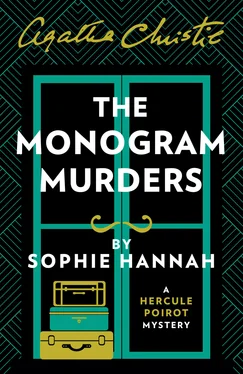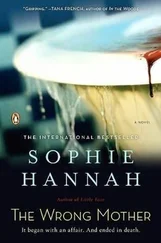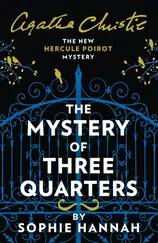He said, ‘She asks no questions, n’est-ce pas? She is not interested in the social exchanges or the conversation? She does not care to find out what is the latest news in the life of anybody else?’
‘Too true!’ Fee looked impressed. ‘There’s not a scrap of curiosity in her. I’ve never known anyone more wrapped up in her own cares. Just doesn’t see the world or the rest of us in it. She never asks you how you’re rubbing along, or what you’ve been doing with yourself.’ Fee tilted her head to one side. ‘You’re quick to catch on, aren’t you?’
‘I know what I know only from listening to you speak to the other waitresses, mademoiselle.’
Fee’s face turned red. ‘I’m surprised you’d go to the bother of listening.’
Poirot had no wish to embarrass her further, so he did not tell her that he greatly looked forward to her descriptions of the individuals he had come to think of, collectively, as ‘The Coffee-House Characters’—Mr Not Quite, for instance, who, each time he came in, would order his food and then, immediately afterwards, cancel the order because he had decided it was not quite what he wanted.
Now was not the appropriate time to enquire if Fee had a name of the same order as Mr Not Quite for Hercule Poirot that she used in his absence—perhaps one that made reference to his exquisite moustaches.
‘So Mademoiselle Jennie does not wish to know the business of other people,’ Poirot said thoughtfully, ‘but unlike many who take no interest in the lives and ideas of those around them, and who talk only about themselves at great length, she does not do this either—is that not so?’
Fee raised her eyebrows. ‘Powerful memory you’ve got there. Dead right again. No, Jennie’s not one to talk about herself. She’ll answer a question, but she won’t linger on it. Doesn’t want to be kept too long from what’s in her head, whatever it is. Her hidden treasure—except it don’t make her happy, whatever she’s dwelling on. I’ve long since given up trying to fathom her.’
‘She dwells on the heartbreak,’ Poirot murmured. ‘And the danger.’
‘Did she say she was in danger?’
‘ Oui, mademoiselle. I regret that I was not quick enough to stop her from leaving. If something should happen to her …’ Poirot shook his head and wished he could recover the settled feeling with which he had arrived. He slapped the tabletop with the flat of his hand as he made his decision. ‘I will return here demain matin . You say she is here often, n’est-ce pas? I will find her before the danger does. This time, Hercule Poirot, he will be quicker!’
‘Fast or slow, don’t matter,’ said Fee. ‘No one can find Jennie, not even with her right in front of their noses, and no one can help her.’ She stood and picked up Poirot’s plate. ‘There’s no point letting good food go cold over it,’ she concluded.
CHAPTER 2
Murder in Three Rooms
That was how it started, on the evening of Thursday, 7 February 1929, with Hercule Poirot, and Jennie, and Fee Spring; amid the crooked, teapot-huddled shelves of Pleasant’s Coffee House.
Or, I should say, that was how it appeared to start. I’m not convinced that stories from real life have beginnings and ends, as a matter of fact. Approach them from any vantage point and you’ll see that they stretch endlessly back into the past and spread inexorably forward into the future. One is never quite able to say ‘That’s that, then,’ and draw a line.
Luckily, true stories do have heroes and heroines. Not being one myself, having no hope of ever being one, I am all too aware that they are real.
I wasn’t present that Thursday evening at the coffee house. My name was mentioned—Edward Catchpool, Poirot’s policeman friend from Scotland Yard, not much older than thirty (thirty-two, to be precise)—but I was not there. I have, nevertheless, decided to try to fill the gaps in my own experience in order make a written record of the Jennie story. Fortunately, I have the testimony of Hercule Poirot to help me and there is no better witness.
I am writing this for the benefit of nobody but myself. Once my account is complete I shall read and reread it until I am able to cast my eyes over the words without feeling the shock that I feel now as I write them—until ‘How can this have happened?’ gives way to ‘Yes, this is what happened.’
At some point I shall have to think of something better to call it than ‘The Jennie Story’. It’s not much of a title.
I first met Hercule Poirot six weeks before the Thursday evening I have described, when he took a room in a London lodging house that belongs to Mrs Blanche Unsworth. It is a spacious, impeccably clean building with a rather severe square façade and an interior that could not be more feminine; there are flounces and frills and trims everywhere. I sometimes fear that I will leave for work one day and find that somehow a lavender-coloured fringe from some item in the drawing room has attached itself to my elbow or my shoe.
Unlike me, Poirot is not a permanent fixture in the house but a temporary visitor. ‘I will enjoy one month at least of restful inactivity,’ he told me on the first night that he appeared. He said it with great resolve, as if he imagined I might try to stop him. ‘My mind, it grows too busy,’ he explained. ‘The rushing of the many thoughts … Here I believe they will slow down.’
I asked where he lived, expecting the answer ‘France’; I found out a little later that he is Belgian, not French. In response to my question, he walked over to the window, pulled the lace curtain to one side and pointed at a wide, elegant building that was at most three hundred yards away. ‘You live there? ’ I said. I thought it must be a joke.
‘ Oui . I do not wish to be far from my home,’ Poirot explained. ‘It is most pleasing to me that I am able to see it: the beautiful view!’ He gazed at the mansion block with pride, and for a few moments I wondered if he had forgotten I was there. Then he said, ‘Travel is a wonderful thing. It is stimulating, but not restful. Yet if I do not take myself away somewhere, there will be no vacances for the mind of Poirot! Disturbance will arrive in one form or another. At home one is too easily found. A friend or a stranger will come with a matter of great importance comme toujours —it is always of the greatest importance!—and the little grey cells will once more be busy and unable to conserve their energy. So, Poirot, he is said to have left London for a while, and meanwhile he takes his rest in a place he knows well, protected from the interruption.’
He said all this, and I nodded along, as if it made perfect sense, wondering if people grow ever more peculiar as they age.
Mrs Unsworth never cooks dinner on a Thursday evening—that’s her night for visiting her late husband’s sister—and this was how Poirot came to discover Pleasant’s Coffee House. He told me he could not risk being seen in any of his usual haunts while he was supposed to be out of town, and asked if I could recommend ‘a place where a person like you might go, mon ami— but where the food is excellent’. I told him about Pleasant’s: cramped, a little eccentric, but most people who tried it once went back again and again.
On this particular Thursday evening—the night of Poirot’s encounter with Jennie—he arrived home at ten past ten, much later than usual. I was in the drawing room, sitting close to the fire but unable to warm myself up. I heard Blanche Unsworth whispering to Poirot seconds after I heard the front door open and shut; she must have been waiting for him in the hall.
I couldn’t hear what she was saying but I could guess: she was anxious, and I was the cause of her anxiety. She had arrived back from her sister-in-law’s house at half past nine and decided that something was wrong with me. I looked a fright—as if I hadn’t eaten and wouldn’t sleep. She’d said all this to me herself. I don’t know quite how a person manages to look as if he hasn’t eaten, incidentally. Perhaps I was leaner than I had been at breakfast that morning.
Читать дальше












